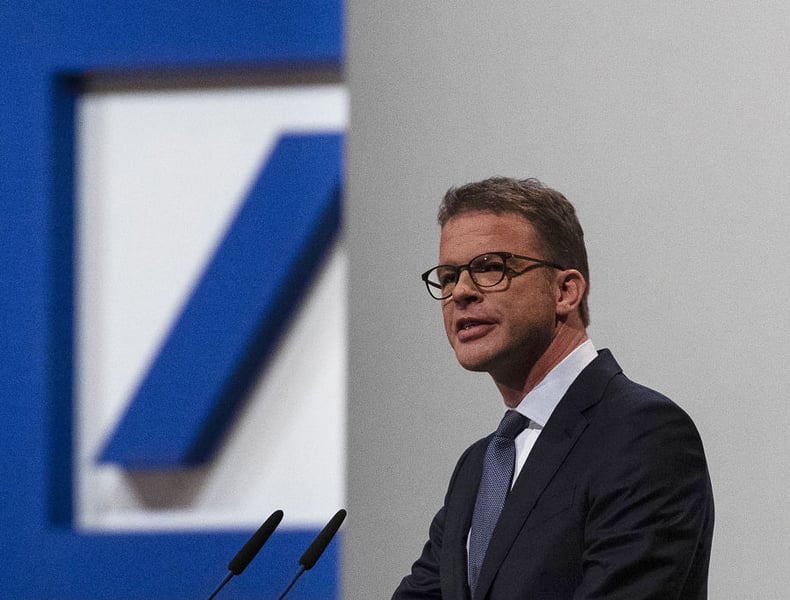Deutsche Bank unveiled a radical overhaul that will see the lender exit its equities business, post a 2.8 billion-euro ($3.1 billion) second-quarter loss and cut the workforce by a fifth to reverse a slide in profitability.
Chief Executive Christian Sewing will shelve the dividend this year and next and take restructuring charges of 7.4 billion euros through 2022 to pay for an overhaul that shrinks the German lender's once-mighty investment bank along with its global footprint and key fixed-income business.
(
More:
Deutsche Bank to add 300 employees to wealth management ranks)
Deutsche Bank shares were down 0.7% in Frankfurt trading as of 12:35 p.m. after climbing as much as 4.4% earlier. The lender's riskiest bonds also reversed earlier gains, with perpetual notes down about 0.5 euro cents to around 90 cents on the dollar and notes callable in 2022 down 0.4 cents. Analysts said that while the restructuring was broader than expected, the newly announced targets will be tough to achieve.
"Today we have announced the most fundamental transformation of Deutsche Bank in decades," Mr. Sewing said in a statement on Sunday. "We are tackling what is necessary to unleash our true potential."
The scale of the revamp underscores the failure of Mr. Sewing and his recent predecessors to solve the fundamental problem: costs were too high and revenue too low. After government-brokered merger talks with Commerzbank AG collapsed in April, the CEO had few alternatives to bolster market confidence. His plan was approved by the board at a meeting Sunday.
Some of the financial targets set out in the plan look overly optimistic and the goal of achieving a return on tangible equity of 8% by 2022 looks "highly improbable," Citigroup analysts including Andrew Coombs, Nicholas Herman wrote in a note to investors.
Christian Sewing, chief executive officer of Deutsche Bank AG, addresses the bank's annual general meeting in Frankfurt, Germany, on Thursday, May 23, 2019. Deutsche Bank's leadership on Thursday will face investors exasperated by years of low profit and a falling share price.
(
More:
Wells Fargo must find an outsider for its next CEO)
About 74 billion euros of risk-weighted assets will become part of a new non-core unit and the lender's capital buffer will be reduced as part of the plan. With the stock price down by half in the past two years, selling new shares wasn't an option and the bank said it does not plan a capital increase to pay for the overhaul.
Instead, Mr. Sewing is tapping into the bank's capital cushion to fund what he's billed as the bank's biggest restructuring in decades ?— which means he needs to be strategic with the scarce financial resources he can generate. It will be the first time since at least 1993 that Deutsche Bank won't distribute a dividend.
Key points of the plan and the bank's financial estimates:
• Targets headcount of 74,000 by 2022.
• Restructuring cost of 3 billion euros in 2Q, 5.1 billion over 2019.
• Cutting risk-weighted assets by about 40% in effected businesses.
• No dividend to be paid for 2019, 2020.
• Plans to invest 4 billion euros in improving controls by 2022.
• Creates fourth division to be known as corporate bank.
• Sees private bank ROTE above 12% in 2022.
Departures
The bank said retail chief Frank Strauss and Chief Regulatory Officer Sylvie Matherat, both board members, will leave this month. The departure of investment bank head Garth Ritchie was announced on Friday.
(
More:
Deutsche Bank settles 401(k) self-dealing lawsuit for $21.9 million)
Other executives will be on the rise. Stefan Hoops was named to oversee the new "corporate bank" unit that will combine the transaction bank and the lender's corporate-clients unit. Three management board members where appointed: Christiana Riley is taking over responsibilities for the Americas, Bernd Leukert, formerly of SAP AG, will join Sept. 1 and be responsible for data and innovation. Stefan Simon will become chief administrative officer and oversee regulatory and legal affairs.
The investment bank is the focus of the overhaul. The unit, which accounts for roughly half of Deutsche Bank's revenue and which was the cause of its decline, will be broken in two.







